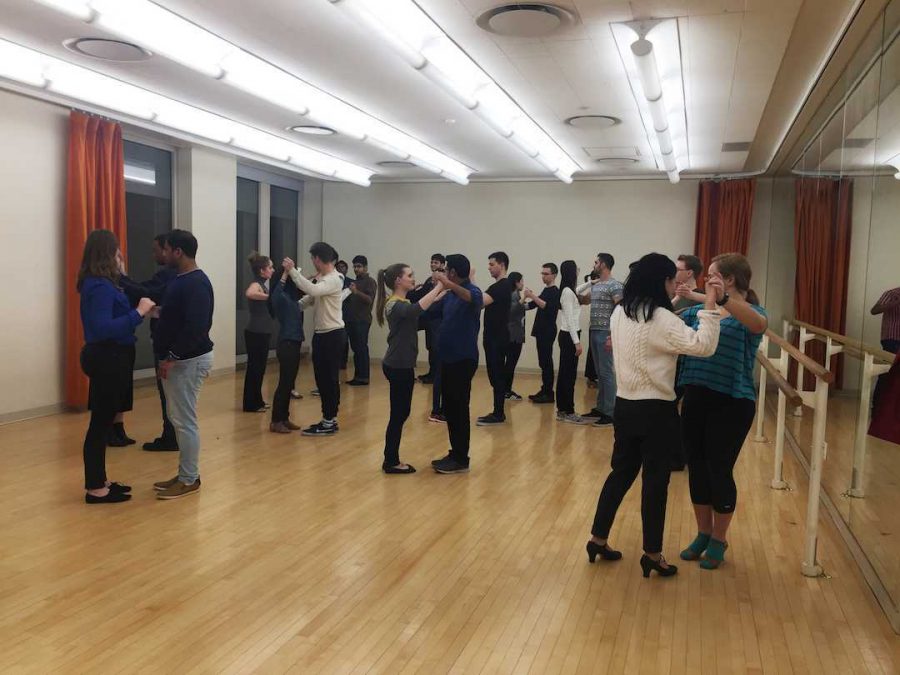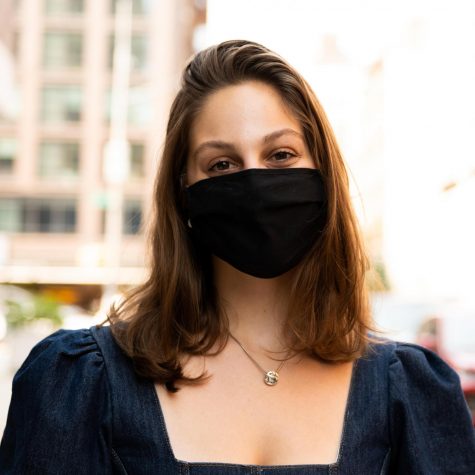NYU, reverse the ban on in-person performing arts clubs
On Sept. 22, university senior leadership prohibited performing arts clubs from meeting in-person until further notice. But with a majority of university activity in person, this decision is unfair.
On Sept. 22, University officials made the decision to ban NYU’s performing arts clubs from meeting in person for the time being. This decision creates confusion when considering that most of NYU’s activities take place in person. (Photo by Nika Woodfill)
October 4, 2021
Put yourself in an NYU student’s shoes.
You love choreographing with Pulse Dance Project, singing an alto harmony for the N’Harmonics, performing sketches for Friends with Dads or delivering a monologue for an Uproar Theatre Corps production. After missing a year and a half of these opportunities due to the pandemic and remote learning, you experience the excitement of three weeks of in-person rehearsals at the start of the fall 2021 semester. Every note is perfectly in tune, each step flows into the next, the jokes tickle audiences’ throats. Sure, there is an abundance of performing arts classes to take at the university, but nothing replaces the spirit, camaraderie and hands-on experience of arts clubs.
Having regained the joy of rehearsing in person again, imagine receiving the following email from NYU Engage on Sept. 22.
“After much discussion with University officials… performance based student organizations (e.g., singing, dancing, acting, wind instruments) and fitness based organizations (e.g., Jiu Jitsu, quidditch) will not be permitted to practice or perform in-person, for the time being,” the email reads. “In-person performing arts will only be permitted in connection to academic courses.”
This policy is inconsistent, hypocritical and inconsiderate. If NYU senior leadership truly understood students’ values and experiences, they would recognize that this policy is simply nonsensical. While the university attempts to demonstrate its care for students’ safety by keeping COVID-19 transmission rates low, the decision seems like a misguided effort that promotes inequality among the student body.
In an email sent on Sept. 21, NYU senior leadership boasted that 99% of students are fully vaccinated, shared that the university has a 1.39% positivity rate and claimed that classroom transmission is minimal. High vaccination rates and COVID-19 safety precautions are reasons for which students and faculty can attend class in person without social distancing. Thanks to these high rates, NYU first-years attended an a cappella showcase and Drag Bingo in the Skirball Center for the Performing Arts with hundreds of their peers. If this many students can get all cozy yelling “bingo!” or singing songs about safety, why can’t a 12-person improv group rehearse outside with masks?
NYU allows music, dance and performance-based classes to congregate with masks on. But when performing arts clubs — which do similar shows, combinations and scores — want to hold in-person rehearsals with the same safety precautions, the administration finds the situation unsafe, suggesting that a faculty member need be present to supervise people’s singing, dancing or acting. University senior leadership is sending the message that it does not trust its students to keep each other safe and prevent the spread of COVID-19. In other words, this policy demands one thing NYU students are too old for: babysitters.
The university’s policy currently affects numerous organizations and individuals across NYU’s schools, but students are learning about the rule at different times; some do not know that such a policy exists at all because the university has yet to inform them. I received notice on Sept. 22, but Steinhardt senior and Co-President of Composers’ Collective Noah Horowitz first heard about the policy on Oct. 1. What upset Horowitz was that he does not want to host large-scale events, but rather wants to sing with his guitar for a small audience.
“Most music students at NYU regularly sing with masks and without distancing,” Horowitz said. “This is allowed in class, but now my club can’t have even one masked person sing distanced away from the audience at a concert.”
The student’s experience illustrates one of NYU’s policies involving masks in performing arts classes. In an email sent to Tisch students on Sept. 29, the school’s Office of Student Affairs disclosed that students can also apply to not wear masks in class.
“If you would like to be approved to remove your mask in one of the pre-approved academic-related activities outlined in Specific Guidelines, please submit this mask removal approval request form,” the email reads. “As a reminder, this approval is only granted to fully-vaccinated students in acting, voice, wind, and brass who wish to remove masks”
In the specific guidelines mentioned in the email, performing arts classes do not have to socially distance as long as they are vaccinated and wear masks. The opportunity to be maskless in class is only allowed for brief periods of time. Having read these guidelines, I believe asking to host a performance-based club meeting with masks is in line with university policy and is a more than reasonable request.
I could not discuss this policy without mentioning that NYU NCAA sports teams are allowed to practice in person and to travel to compete. What is the difference between a sweaty basketball player panting for air as she passes a ball around the court and a dancer rehearsing a routine? I genuinely struggle to see the difference between the two. Both are physical, involve large groups of people and must have similar transmission rates.
Regardless of the conflicting COVID-19 guidelines between performing arts classes and clubs, there is one important element that NYU’s senior leadership fails to acknowledge. Music, drama, dance and comedy might seem like cute pastimes for students to participate in outside of class, but they are actually an extension of students’ education. Yes, one can learn the fundamentals of an artistic discipline in class, but where can she apply these skills in a safe and independent environment? Performing arts extracurriculars allow students the opportunity to have hands-on experiences that can simulate professional work. Participants learn how to collaborate with others, multi-task and think on their feet, in addition to many other valuable skills. Even though students can host rehearsals on Zoom, the experience is neither nearly as valuable nor a realistic representation of how the industry functions in a world without COVID-19 — something students must witness before entering the workforce.
Even if some students do not view extracurriculars as part of their education, senior leadership should at least recognize that clubs are an integral part of the college experience. Extracurriculars are where students who share mutual interests forge friendships, memories and connections. Having spent a year and a half of college on Zoom, NYU students have lost and suffered enough. Who is senior leadership to take more away from them, especially when the rest of the world is shifting back to pre-pandemic life?
The most aggravating part of the new policy is NYU’s usage of the phrase “for the time being” in the initial email announcement sent Sept. 22. “For the time being” is vague. Alongside having to cancel all of their plans, students are left wondering whether this rule will be in effect for a month, the semester or the entire academic school year. Without specific information, how is anyone supposed to develop a new plan for the semester, create schedules or build budgets?
Steinhardt senior and President of Pulse Dance Project Jordan Lopez is one of many students whose club had no choice but to scrap all of its plans and resort to Zoom — a move that is not a replacement for being in person.
“The ban on in-person rehearsals for performing arts clubs has impacted Pulse a great amount,” Lopez said. “The email from club life completely blindsided us, we had spent so much time and energy working on how we could find space to dance and now everything we were working on was basically for nothing… The whole point of our club is to be an outlet for people to dance, especially because most of us are not dance majors. This news has been very upsetting for all of our club members and this semester will be hard with trying to keep the morale and energy of Pulse up while we are still stuck with zoom rehearsals.”
Between in-person classes, sold-out Broadway productions, packed musical festivals, and other venues and events slowly easing COVID-19 restrictions, NYU senior leadership’s policy is uncalled for. Such a decision illuminates how leadership practices favoritism that benefits classes and sports teams to assure that the university has high enrollment rates, maintains its high rankings and earns consistent positive PR. However, if leadership chooses to remain complacent on an issue that impacts a large portion of students at an elite performing arts school, it is guaranteed that NYU will have worries aside from COVID-19 transmission rates come the application deadline for prospective students.
A version of this article appeared in the Oct. 4, 2021, e-print edition. Contact Sasha Cohen at [email protected].

























































































































































